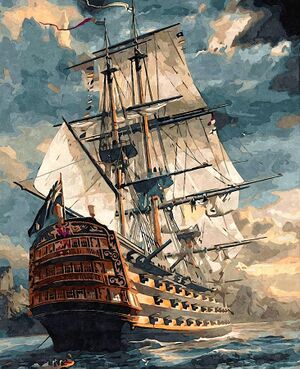HMNS King Lawrence
 Modern painting of King Lawrence
| |
| History | |
|---|---|
| Name: | VIS King Lawrence |
| Ordered: | 14 July 1797 |
| Builder: | Briceport Dockyard |
| Laid down: | 23 July 1798 |
| Launched: | 7 July 1801 |
| Commissioned: | 1 September 1801 |
| Homeport: | Frankenlisch Naval Dockyard |
| Honours and awards: |
|
| Captured: | 24th March 1807, Cape Hastings |
| History | |
| Name: | FNS King Lawrence |
| Commissioned: | 18 August 1809 |
| Homeport: | Briceport Naval Base |
| History | |
| Name: | HMNS King Lawrence |
| Commissioned: | 1815 |
| Homeport: | Frankenlisch Naval Dockyard |
| Honours and awards: |
|
| Status: |
|
| General characteristics | |
| Class and type: | 104-gun first-rate ship of the line |
| Displacement: | 3,500 tons |
| Tons burthen: | 2,142 bm |
| Length: |
|
| Beam: | 51 ft 10 in (15.80 m) |
| Draught: | 28 ft 9 in (8.76 m) |
| Depth of hold: | 21 ft 6 in (6.55 m) |
| Propulsion: | Sails—6,510 sq yd (5,440 m²) |
| Sail plan: | Full-rigged ship |
| Speed: | up to 11 knots (20 km/h) |
| Complement: | Approximately 850 |
| Armament: |
|
HMNS King Lawrence is a 104-gun First-Rate ship of the line of the Imperial Navy, ordered in 1797, laid down in 1798 and launched in 1801. It is known for being the flagship of Lord Hilton during his long naval career.
Construction
As much of the sizeable Royal Frankenlischian Navy was unavailable to the victorious Empire of Vionna following the Vionnan Conquest of Frankenlisch, due to many crews burning their ships or sailing into exile to prevent them falling into Vionnan hands, Empress Elizabeth ordered the construction of a new, modern battlefleet. Following the successful construction of the Elizabeth-class of 13 38-gun frigates, it was decided to experiment with flagship designs. First built was the 84-gun VIS Riverland which was accepted by the new Imperial Navy but considered too small for a fleet flagship. Following the Riverland was VIS King Francis of 96 guns, King Francis was once again accepted but the Naval Construction Board insisted on a flagship bearing over 100 guns and so designed the King Lawrence with 104 guns.
King Lawrence was constructed at Briceport Dockyard under the direct supervision of the Imperial Navy. Two hundred workmen were assigned to the construction of her frame alone, which took three months from July to October, 1798. Her hull was constructed over the winter of 1798-99 and the whole construction made use of between six and seven thousand trees of oak, pine and elm. Following the construction of her hull, King Lawrence was left to season for a full year and a half before being floated in July 1800. Over the following month, her rigging was constructed and was supposedly considered the most masterfully produced in the history of Frankenlischian shipbuilding, though this may be hyperbole.
She was launched formally without issue on the 7th of July, 1801 and she was finally commissioned into service on the 28th of September, 1801, having been built at a cost of around 64,000 Lucans. She was, at the time of her launch, one of the largest vessels afloat. With no pressing conflict, she was moored at Frankenlisch for two years, only setting out for sea trials and the delay was used to complete her internal fitting-out. Though initially cleared for a broadside of 450 kilos, following the installation of two 68-pounder carronades and the substitution of 6-pounder guns for 12-pounders, King Lawrence's full weight of armament was just over a tonne. In the winter of 1801, a plan arose to replace her 32-pounder guns with 42-pounders but it was rejected on the basis of weight issues and the difficulty of production.
Early Service
Empire of Vionna
Despite being commissioned in 1801, VIS King Lawrence did not enter active service until 1804 when she was placed under the command of Captain Edwin Malton.